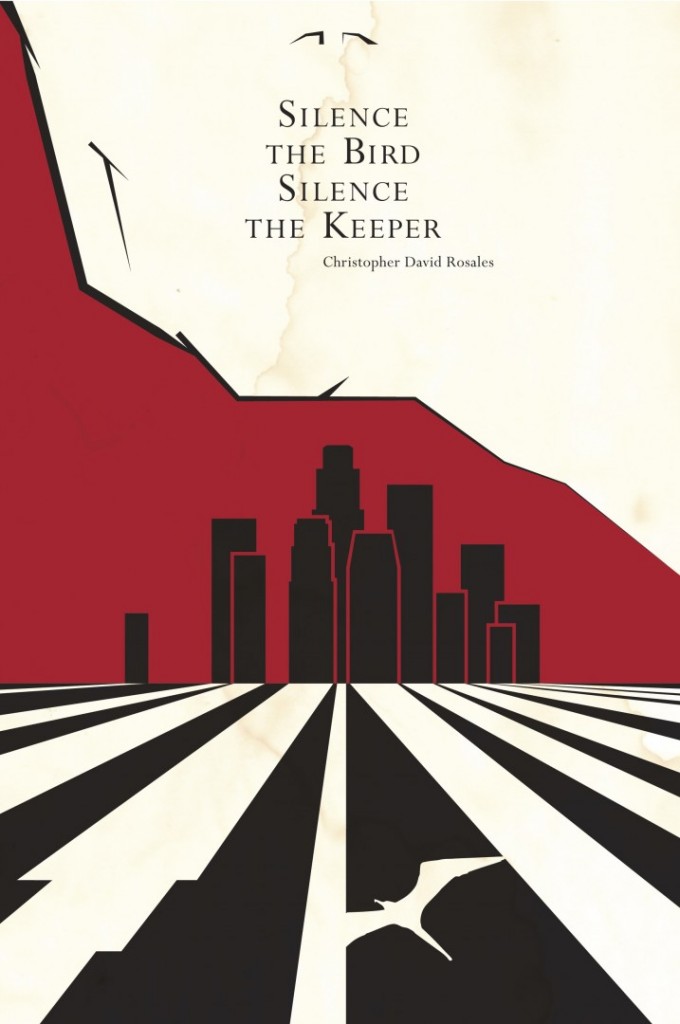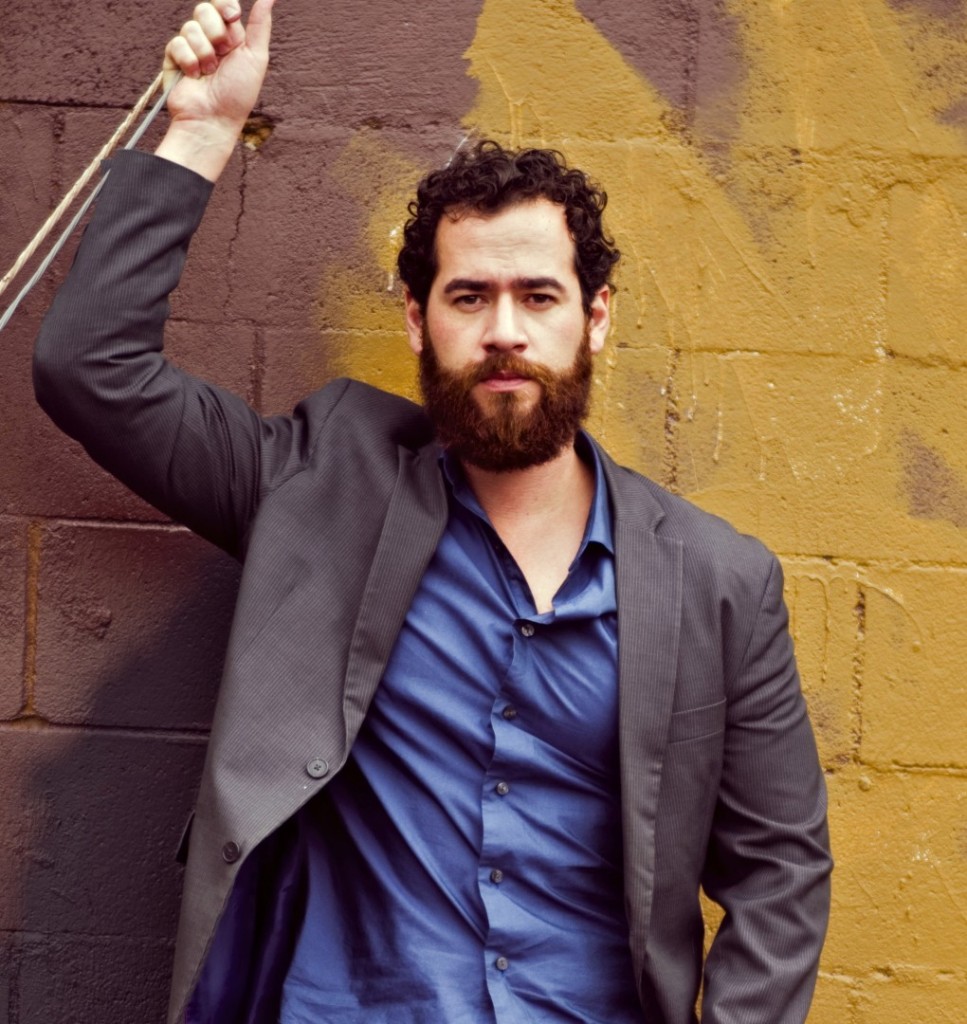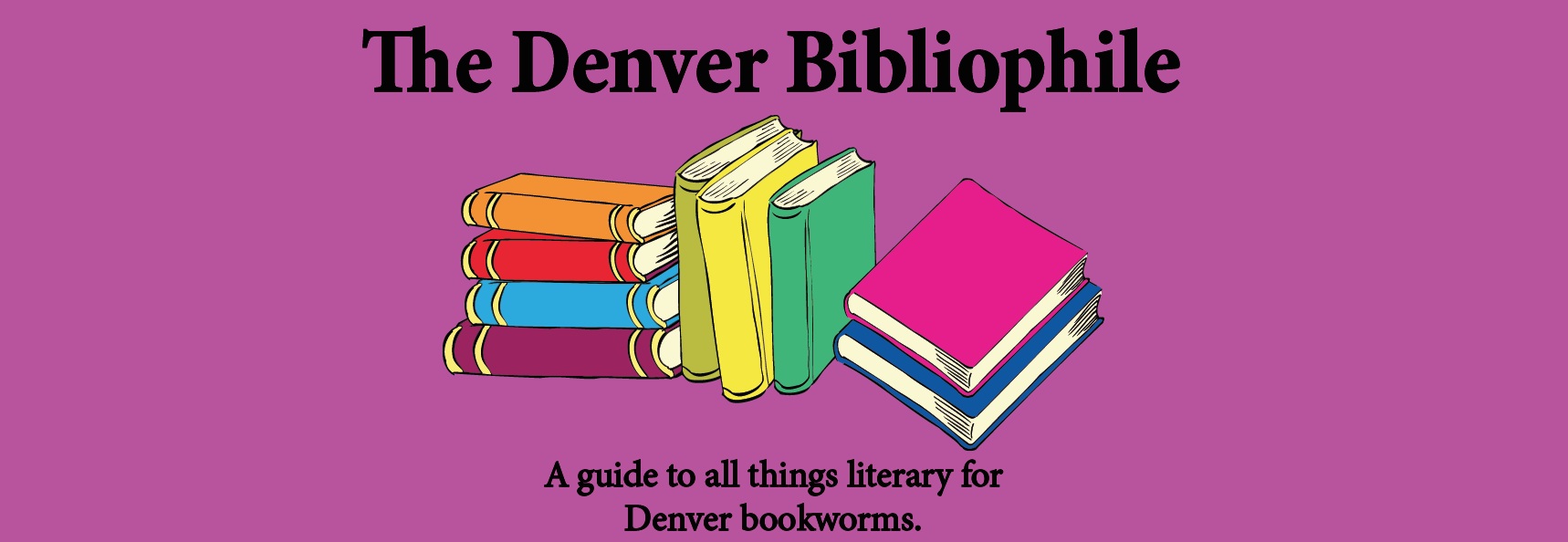It’s officially the last days of summer, and that means that soon I’ll be overwhelmed with school work, thesis writing, extracurricular activities and the general insanity of senior year. This also means that it’s time for my last post as The Denver Bibliophile (at least for now). All summer I’ve been wanting to do a Q&A with a local author, so I decided to go out with a bang and interview an author right here at DU.
This week, I was lucky enough to chat with Christopher David Rosales, a PhD candidate in DU’s creative writing program. Christopher is also the fiction editor at SpringGun Press, and his work has appeared anthologies and journals in the U.S. and abroad. His first novel, “Silence the Bird, Silence the Keeper,” was released this month.

Denver Bibliophile: In a few sentences, how would you describe “Silence the Bird, Silence the Keeper”?
Christopher David Rosales: Tre, a young and much-beloved brother and son, finds himself caught in a city where all its citizens, even its most dangerous, are potential targets in the on-going power struggle between an authoritarian military regime and the selfish interests of a guerrilla force. He’s been making his money as a plomero, a street assassin, but now he might be the only one who can do good and save his family.
DB: This is your debut novel. From where did you draw your inspiration for the project?
CDR: The book represents America speculatively as a dystopia fraught with political corruption and violence—an America any of us might rightly decide to leave behind. My teenage years were in the ‘90s, when gang warfare was a profound social concern often dismissed as a byproduct of pop-culture, “too much rap or metal music” or an inaccurately perceived gluttony of the people most inflicted upon by horrible socio-economical circumstances forcing them to fight to survive. So the more I traveled and read and researched the more I began to see how important it was to legitimize the gang wars of the ‘90s, and the violence we see in the news today, as war.
The rates of PTSD in American inner cities are as high or higher than Iraq, Afghanistan or Vietnam veterans. To make a long answer longer, the more I researched poverty and violence in cities in Latin America, a place so often and unfortunately called ‘third-world’—how distancing is that language, right? Not this world, but another— the more I began to think… you know, it’s not always such a stretch. Whether in Los Angeles, Baltimore, Chicago, Atlanta or Ferguson… for some Americans, day-to-day life does not feel like first-world life. In fact, for many watching television, accounts of life in America feel otherworldly.
DB: Do you have a favorite line or passage from the book?
CDR: The first few lines, because they establish that the novel is told in a communal “we” voice:
“In the city square where all our little barrios met, even quiet steps frightened the swarms of dirty birds—up like ghosts, their wings swiped breaths right off your face—and it was there we always whispered round the story about the baby. Not about the baby, but the baby’s death. Murder, really.”
On the level of speech more than poetry, I felt that passage was critical. The voice of the townspeople telling their own story. This was so important to me because, firstly, it’s how I heard so many stories told in my family and groups of friends. We spoke with each other, for each other, interrupted, critiqued, laughed and shouted as we spoke. Ha. Family parties were loud, I’m telling you. It wasn’t until I moved from Paramount, California to Boulder, Colorado that I realized not all cultures communicate that way. And you know what? I missed noise so badly! Writing this book was a way for me to give life to all the voices I missed.
Secondly, that communal voice spreads the message that no matter how victimized any of us in the world might be, by any circumstance, we still have our own story to tell. I deliberately kept cultural origins ambiguous at times, because however differently cultures share their stories, their voices, we all share the culture of storytelling.
DB: According to your publisher, the book is an innovative mix of magical realism and dystopian fiction. At a time when dystopian fiction is becoming more and more prominent, how did you preserve your unique voice and vision while writing this novel?
CDR: After I moved away from home I began to write about nothing but home. I think that stepping outside of my hometown and seeing what was different about other cities highlighted what was unique about my own. And I began to notice, or have it pointed out to me, that when I was at home I spoke differently than when I was away at graduate school. The hometown voice was a kind of playfully poetic slang made of the urban Latino, African-American and Caucasian cultures I grew up around, mixed with all of the books my family constantly read, mixed with all of the “canon” I wanted to be like, like Cormac McCarthy, Carson McCullers, William Faulkner, Toni Morrison and Flannery O’Connor.
And while Los Angeles lends itself to an unexpected relationship to the Southern Gothic tradition, exploring histories of race and violence and poverty and humor in the face of it all, the place also has an intimate relationship to the history of noir. So, the voice of this book is often that voice of my community not now, but in the ‘90s. It’s a voice that I don’t use in certain venues; not because I’m ashamed of it, but because I cherish it and want to see it honored as I try to in this book.

DB: How would you describe your writing process (if you feel that you have a specific ‘process’)?
CDR: I definitely have a writing process, and I think that’s because I try to demystify that whole ‘art’ thing that can tie people up and prevent work getting done while they’re waiting for their muse. A wonderful Denver poet Mathias Svalina once said something like (and I’m not directly quoting here): As a writer, I’ve never heard a plumber begin a sentence with the phrase “As a plumber.” That’s how I like to think about writing. As work I love to do, yes, but also as work I have a responsibility to get done. My grandfather was a longshoreman. I should wake up and work, no? I always try to have one book I’m editing as fiction editor for SpringGun Press in Denver, one book of my own I’m revising, one book I’m currently writing and one book I’m researching and outlining. That’s my rotation. On the side, I write articles and short stories to stay loose and answer questions my heart feels are pressing.
DB: Who do you go to for advice about your writing?
CDR: Now that I’m at DU I’m so lucky to get to go straight to the writers I admire most. My colleagues and the faculty here are incredible, and along with my former peers and faculty in CU’s MFA, they are among the best writers writing today. I still, however, always try to have friends who aren’t writers give me advice. I’ve never wanted to write for other writers. I sincerely hope that other writers appreciate what I do, but I never want my writing to appeal exclusively to an academic or writing audience. What I hope most is that the books and stories appeal to a diverse audience, and if they don’t appeal, that they provoke new thoughts.
DB: What are you currently reading?
CDR: Currently I’m reading Truman Capote’s “In Cold Blood” in preparation for the crime writing class I’m teaching this fall at DU. I just finished May-Lan Tan’s short story collection “Things to Make and Break” on our list for Laird Hunt’s fiction workshop, and it’s one of the best short story collections I’ve read in a long time.
DB: What authors have been the biggest inspiration to you thus far? Why?
CDR: Firstly, mentors in my writing programs that I’ve been fortunate to work with and ask questions of in person. People like Ruth Ellen Kocher, Marcia Douglas and Stephen Graham Jones at CU. Selah Saterstrom, Brian Kiteley and Laird Hunt at DU. I think they all inspire most because they balance being incredible teachers and writers, all while traveling and reading and having a general lust for life. I watch them and I think, wow, I want to be like that. As a younger reader I devoured the works of literary realists like Raymond Carver and James Baldwin, stylistic lyricists like Michael Chabon, Toni Morrison, John Updike and speculative noir, sci-fi, and fantasy writers like Roger Zelazny and Gene Wolfe. This is all to say that I’ve found it best suits me to read far and wide and diverse. I’m an excitable boy at heart. I’m always tapping my toes. That’s the way I read and write too.
DB: Your next project is “Gods on the Lam,” set to release in summer 2016. How has your writing changed over the course of these two novels?
CDR: That’s the best follow-up question to my last response, because my newest book and my next book couldn’t be more different, just like the one I’m working on now is a world apart from the first two.
“Gods on the Lam” is a kind of genre mash-up interrogating the serious themes of memory, of past trauma and of mental and emotional healing. But I also wanted to pay homage to the writers who always tricked me into turning pages: sci-fi and crime and western writers. So I placed those themes like toys in the same shoe-box with all of the expectations of a sci-fi novel, a crime novel and a western novel, and concocted a kind of chemistry experiment. What came out is “Gods on the Lam.” It’s like “The X-Files” and “Breaking Bad” if they were a melodrama play written in the style of Sam Shepard.
I had a lot of fun with it. I hope readers will too. I’m so happy it found a home with Perpetual Machine Publishing for publication next summer. When I was a little boy my dad used to read me a Roger Zelazny series called “The Chronicles of Amber.” This book is my tribute to that book. In a way, I think every book is a tribute to another. Reading and writing are one.
DB: What advice do you have for aspiring writers at DU?
CDR: Apprentice yourself to experienced writers, in person. Forge relationships. Sure, read and read and read. And across all boundaries. Read sometimes because you love what you’re reading. And read especially closely when the reading is a chore. Sometimes it’s a chore because the writing is rough, in which case you learn what not to do. Sometimes it’s a chore because the writing is so good, in which case you learn what to try to do everyday. But you’ll never learn as much as when you forge relationships with other writers and talk about why. Why this word? Why this line? Why this story? A lifetime passes too quickly to allow ourselves to do anything without intent. Perhaps especially our writing which, if we’re lucky and diligent, may last even longer than the life that wrote it.
“Silence the Bird, Silence the Keeper” is available as an e-book or hardback copy through Mixer Publishing.

